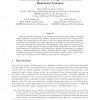Free Online Productivity Tools
i2Speak
i2Symbol
i2OCR
iTex2Img
iWeb2Print
iWeb2Shot
i2Type
iPdf2Split
iPdf2Merge
i2Bopomofo
i2Arabic
i2Style
i2Image
i2PDF
iLatex2Rtf
Sci2ools
126
click to vote
FDL
2003
IEEE
2003
IEEE
Platform-independent Design for Embedded Real-time Systems
With the increasing complexity of the emerging embedded real-time systems, traditional design approaches can not provide sufficient support for the development of these systems anymore. They especially lack the ability to trace and analyse real-time system properties. In this paper, we investigate the design difficulties for embedded real-time systems and propose several principles for coping with these difficulties, which should be incorporated by an “adequate” design approach. Several prevailing design approaches are evaluated against these principles and their merits and drawbacks are examined and illustrated by examples. Finally, a platform-independent approach (POOSL[vdPV97, Gei02] + Rotalumis[vB02]) is introduced to remedy these design problems for embedded real-time systems. Initial experiments have been performed that confirm the advantages of this approach.
Related Content
| Added | 04 Jul 2010 |
| Updated | 04 Jul 2010 |
| Type | Conference |
| Year | 2003 |
| Where | FDL |
| Authors | Jinfeng Huang, Jeroen Voeten, Andre Ventevogel, Leo J. van Bokhoven |
Comments (0)

